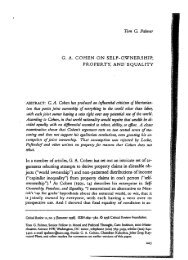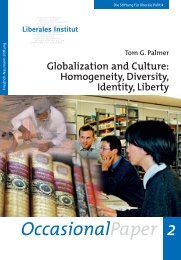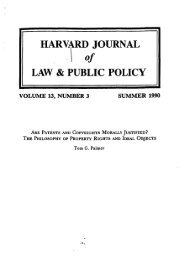Democracy and Limited Government - Tom G. Palmer
Democracy and Limited Government - Tom G. Palmer
Democracy and Limited Government - Tom G. Palmer
You also want an ePaper? Increase the reach of your titles
YUMPU automatically turns print PDFs into web optimized ePapers that Google loves.
I believe, <strong>and</strong> I think you should, too, that democracy without limited government isunsustainable. It is possible to have illiberal democracy, to be sure. But it is not a sustainableproject.The dangers of democratic government, of rule by the demos, have long been known. Democratic– or popular – government, without a suitable constitutional framework limiting power <strong>and</strong>hemming it in with a variety of checks <strong>and</strong> balances, undermines itself. Students of Romanhistory should be aware of the dangers of Marian-style democratic movements, which tend tofocus power on one man or one party as the carrier of the will of the people, as the Romanpopular politician Gaius Marius considered himself.Unlimited democracies run the risk of “one man, one vote, one time,” which is one of the worstlegacies of some modern democratic thinking.In 1819, Benjamin Constant, the great theorist of liberal constitutionalism, in a public addresscontrasted the exercise of “ancient liberty” with the exercise of “modern liberty.” The latter, hesaid,“consisted in exercising collectively, but directly, several parts of the completesovereignty; in deliberating, in the public square, over war <strong>and</strong> peace; in forming allianceswith foreign governments; in voting laws, in pronouncing judgments; in examining theaccounts, the acts, the stewardship of the magistrates; in calling them to appear in frontof the assembled people, in accusing, condemning or absolving them. But if this is whatthe ancients called liberty, they admitted as compatible with this collective freedom thecomplete subjection of the individual to the authority of the community. You findamong them almost none of the enjoyments which we have seen form part of the libertyof the moderns.”Constant warned that the Terror in France, <strong>and</strong> later the rise of the Napoleonic dictatorship <strong>and</strong>the Empire, originated in confusion regarding the nature of liberty of choice – collective orindividual.J.L. Talmon in his study of the French Revolutions, The Origins of Totalitarian <strong>Democracy</strong>,concluded that democracy is not an inherently liberal concept. FareedZakaria’s fine book, TheFuture of Freedom: Illiberal <strong>Democracy</strong> at Home <strong>and</strong> Abroad, focused recent discussion on the dangers3
1. Non-rivalrous consumption, meaning that if one person or a group of personsconsumes the good, it does not diminish the amount available for others to consume.When I eat a bite from an apple, there is less for others, but when I enjoy freedom ofthought, it does not mean that others have less. (I should mention a subclass thatwill be shown to be relevant in a moment: club goods, which are those goods suchthat the enjoyment by one person does not diminish the ability of others to enjoy it,up to some limit, such as watching a movie in a theater. If I open my eyes to watchit, it does not become dim for you, but if more than a certain number crowd into thetheater, the ability to enjoy the show goes down for all.) The second characteristic isthat2. It is difficult, or perhaps at an extreme impossible, to exclude non-payers from theenjoyment of the good. If you enjoy the good of clean fresh air, it is hard to excludeothers from enjoying that good. In many cases we do spend scarce resources toexclude others from enjoying the good, such as in the case of movie theaters, whichhave walls around them <strong>and</strong> ticket booths to exclude non-purchasers from enjoyingthe non-rivalrous spectacle.Advocates of sustainable democracy should reject the single-minded focus on popularsovereignty that constitutes so much of the discourse of modern democracy <strong>and</strong> instead favorconstitutional liberalism, which crucially includes a democratic component. To be successful as ademocracy there must be clear limitations on the domain of public choice. It must be limited, orit will not be stable.A constitutional framework for sustainable democracy must put certain questions <strong>and</strong> issues offthe table. Decisions subject to collective choice must be those that are actually collective goods.The alternative approach, to define as collective goods all those subject to collective choice, is arecipe for conflict, for when those on whom such choices are imposed see them – not ascollective goods, but as collective bads – they will rebel against them. Religion is an obviousexample of that. Making religion subject to collective choice imposes on those who disagree withthe majority what they see – not as merely under or over-provision of a collective good, but as acollective bad. And they are likely to respond to such imposed choice by resistance to theauthority of the state, a process known in its more extreme phases as civil war or even genocide.7
democracy. The experience of Indian democracy testifies to the importance of all of thoseprinciples. The remarkable durability of democracy in India is testament, not only to thestrength of Indian culture, but to the institutional foundations of that democracy, foremostamong them its relatively limited character.The roots of sustainable democracy were understood over 2,500 years ago. They have beendemonstrated to today’s public in this, the world’s largest democracy. Why do so few peopleunderst<strong>and</strong> that to be sustainable, democratic politics must be limited?10











